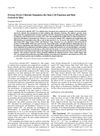 11 citations,
January 2001 in “Cambridge University Press eBooks”
11 citations,
January 2001 in “Cambridge University Press eBooks” Androgens can cause hair growth in some areas but hair loss on the scalp.
 24 citations,
January 2015 in “Annals of Dermatology”
24 citations,
January 2015 in “Annals of Dermatology” Herbal extracts may help hair grow and could be an alternative to synthetic hair loss treatments.
 January 2018 in “Springer eBooks”
January 2018 in “Springer eBooks” Lasers are FDA-approved for permanent hair reduction, not removal, and more research is needed to improve treatments.
 520 citations,
January 2017 in “AIMS biophysics”
520 citations,
January 2017 in “AIMS biophysics” Photobiomodulation therapy using red and near-infrared light can reduce inflammation and aid in healing various conditions.
 16 citations,
November 2011 in “PubMed”
16 citations,
November 2011 in “PubMed” The treatment improved hair growth in people with male pattern baldness.
 36 citations,
April 2013 in “Cell and Tissue Research”
36 citations,
April 2013 in “Cell and Tissue Research” Bone-marrow and epidermal stem cells help heal wounds differently, with bone-marrow cells aiding in blood vessel formation and epidermal cells in hair growth.
 January 1953 in “The Lancet”
January 1953 in “The Lancet” Cortisone may help hair regrow by altering the local environment, with regrowth starting 3-4 weeks after treatment, but its use is not widely recommended.
 February 2023 in “Journal of Ginseng Research/Journal of ginseng research”
February 2023 in “Journal of Ginseng Research/Journal of ginseng research” New ginseng compounds may help treat degenerative diseases.
 100 citations,
June 2011 in “Journal of The American Academy of Dermatology”
100 citations,
June 2011 in “Journal of The American Academy of Dermatology” 5% minoxidil foam once daily works as well as 2% minoxidil solution twice daily for female hair growth and is more convenient.
 47 citations,
October 2014 in “Expert Opinion on Emerging Drugs”
47 citations,
October 2014 in “Expert Opinion on Emerging Drugs” New alopecia treatments aim for better results and fewer side effects.
 31 citations,
January 1989 in “Clinical and Experimental Dermatology”
31 citations,
January 1989 in “Clinical and Experimental Dermatology” The study tested a hair treatment and found it can help grow hair, but won't stop baldness. It's safe and works well, but needs more testing.
 9 citations,
July 2020 in “Experimental Dermatology”
9 citations,
July 2020 in “Experimental Dermatology” Topical L-thyroxine may help with wound healing and hair growth but should be used short-term due to potential risks.
 8 citations,
January 2020 in “Skin Pharmacology and Physiology”
8 citations,
January 2020 in “Skin Pharmacology and Physiology” Caffeine improves hair growth, thickness, and reduces shedding.
 5 citations,
February 2022 in “Acta Biomaterialia”
5 citations,
February 2022 in “Acta Biomaterialia” Nanomaterials can improve hair care products and treatments, including hair loss and alopecia, by enhancing stability and safety, and allowing controlled release of compounds, but their safety in cosmetics needs more understanding.
 November 2023 in “Cureus”
November 2023 in “Cureus” Magnetized saline water lotion increased hair growth in men with hair loss.
 61 citations,
January 2018 in “Cosmetics”
61 citations,
January 2018 in “Cosmetics” Coffee silverskin may be a beneficial and safe ingredient for cosmetics, offering hydration, firmness, and potential hair growth benefits.
33 citations,
May 2016 in “Translational andrology and urology” Laser hair removal before genital surgery can prevent complications and improve patient satisfaction.
 14 citations,
October 2020 in “Natural Products and Bioprospecting”
14 citations,
October 2020 in “Natural Products and Bioprospecting” Various treatments, including FDA-approved drugs, natural products, and oral supplements, can help with hair loss, but a patient's medical history and potential allergies should be considered when choosing a treatment.
 8 citations,
October 2022 in “Regenerative Therapy”
8 citations,
October 2022 in “Regenerative Therapy” New regenerative treatments for hair loss show promise but need more research for confirmation.
 101 citations,
October 2016 in “Nanomedicine: Nanotechnology, Biology and Medicine”
101 citations,
October 2016 in “Nanomedicine: Nanotechnology, Biology and Medicine” Fullerenes show potential in skin care but need more safety research.
 August 2024 in “Stem Cell Research & Therapy”
August 2024 in “Stem Cell Research & Therapy” New regenerative therapies show promise for treating hair loss.
 80 citations,
April 2017 in “Frontiers in Pharmacology”
80 citations,
April 2017 in “Frontiers in Pharmacology” PDRN helps repair tissue and improve wound healing with a high safety profile.
 August 2024 in “Journal of Cosmetic Dermatology”
August 2024 in “Journal of Cosmetic Dermatology” Injectable treatments can effectively and safely improve hair growth in adults with androgenetic alopecia.
 183 citations,
January 2018 in “Cosmetics”
183 citations,
January 2018 in “Cosmetics” Essential oils in cosmetics can offer benefits but may cause allergies and should be used carefully.
 15 citations,
January 2015 in “Skin Pharmacology and Physiology”
15 citations,
January 2015 in “Skin Pharmacology and Physiology” Parathyroid hormones are important for hair growth, but their use in treating hair loss from chemotherapy is still uncertain.
 7 citations,
January 2009 in “Biological & pharmaceutical bulletin”
7 citations,
January 2009 in “Biological & pharmaceutical bulletin” Ferrous Ferric Chloride may improve skin cell function and increase hair growth in mice.
 February 2024 in “Journal of applied pharmaceutical research”
February 2024 in “Journal of applied pharmaceutical research” Herbal hair oils with Coconut, Curry leaves, Amla, Fenugreek, and Onion promote hair growth and are safe.
 26 citations,
December 2006 in “Endocrinology”
26 citations,
December 2006 in “Endocrinology” A cream with a specific hormone blocker increases hair growth in mice.
 6 citations,
April 2020 in “Applied sciences”
6 citations,
April 2020 in “Applied sciences” Hair growth medium helps heal wounds and regrow hair in mice.
 224 citations,
March 2006 in “Seminars in Cutaneous Medicine and Surgery”
224 citations,
March 2006 in “Seminars in Cutaneous Medicine and Surgery” The document concludes that understanding hair follicle biology can lead to better hair loss treatments.





























